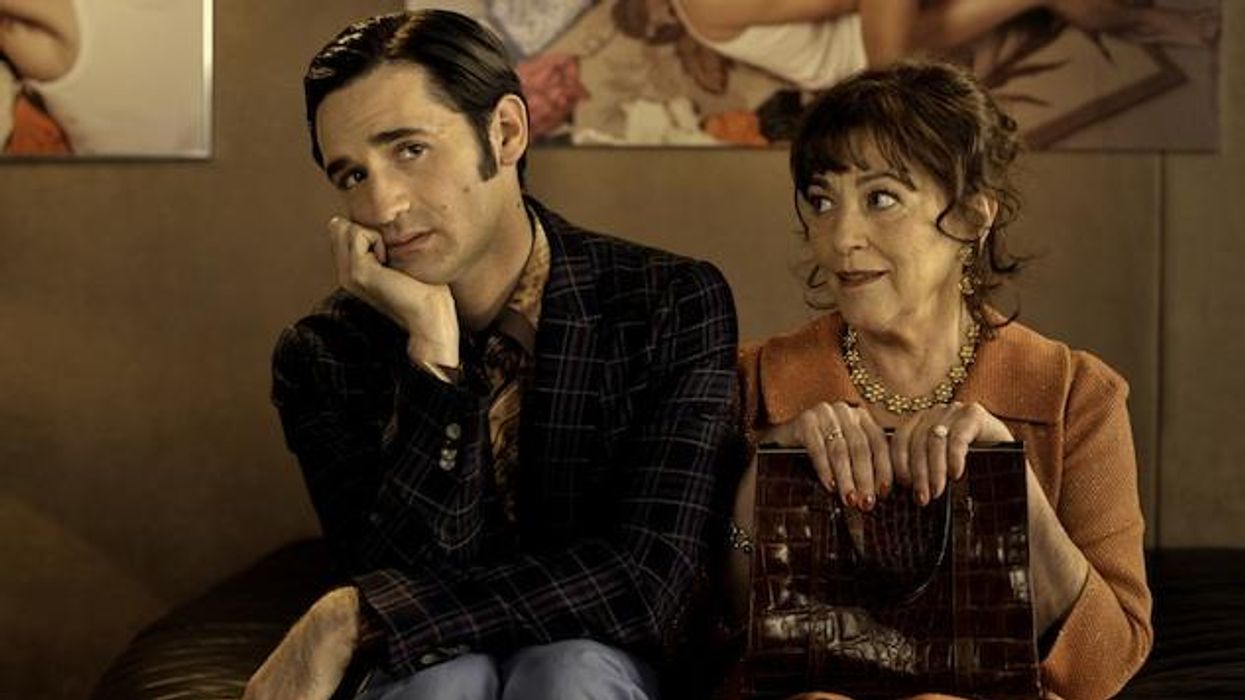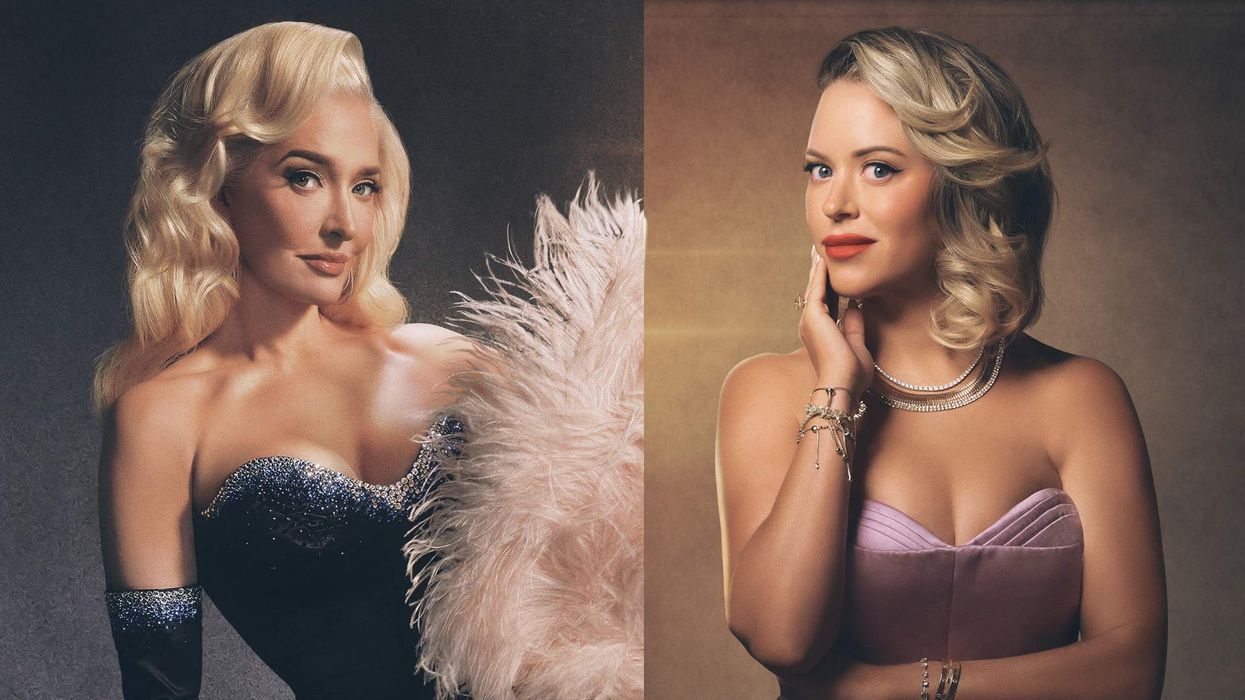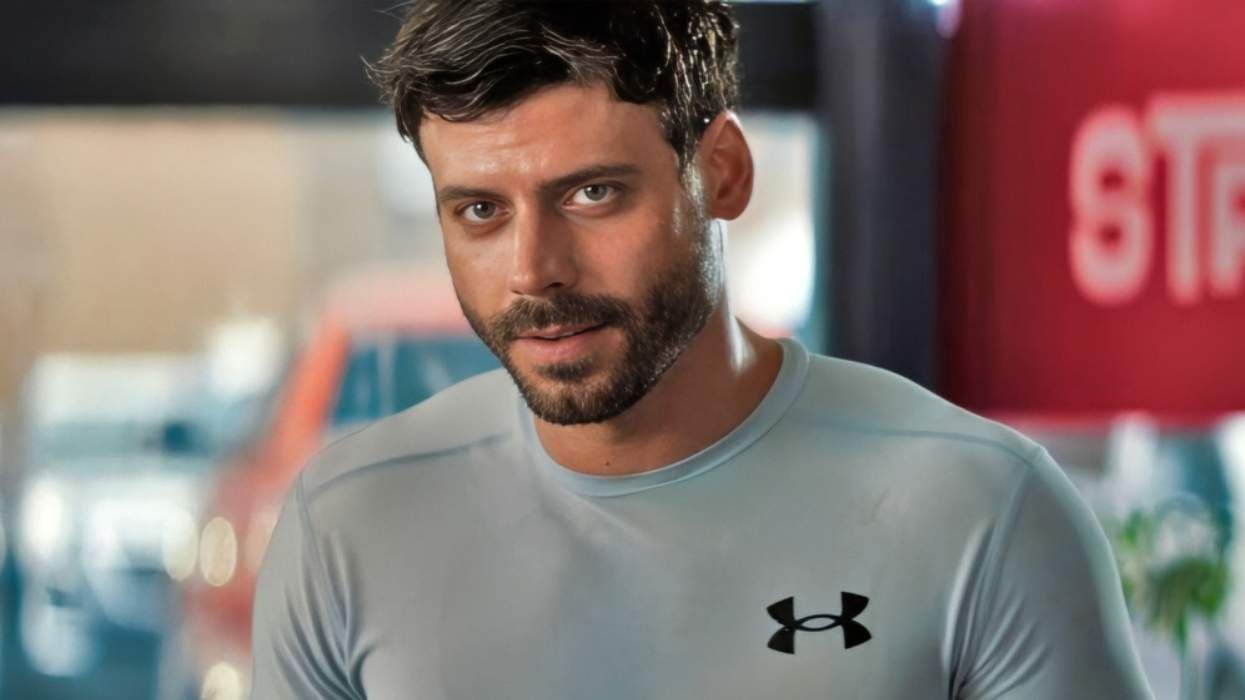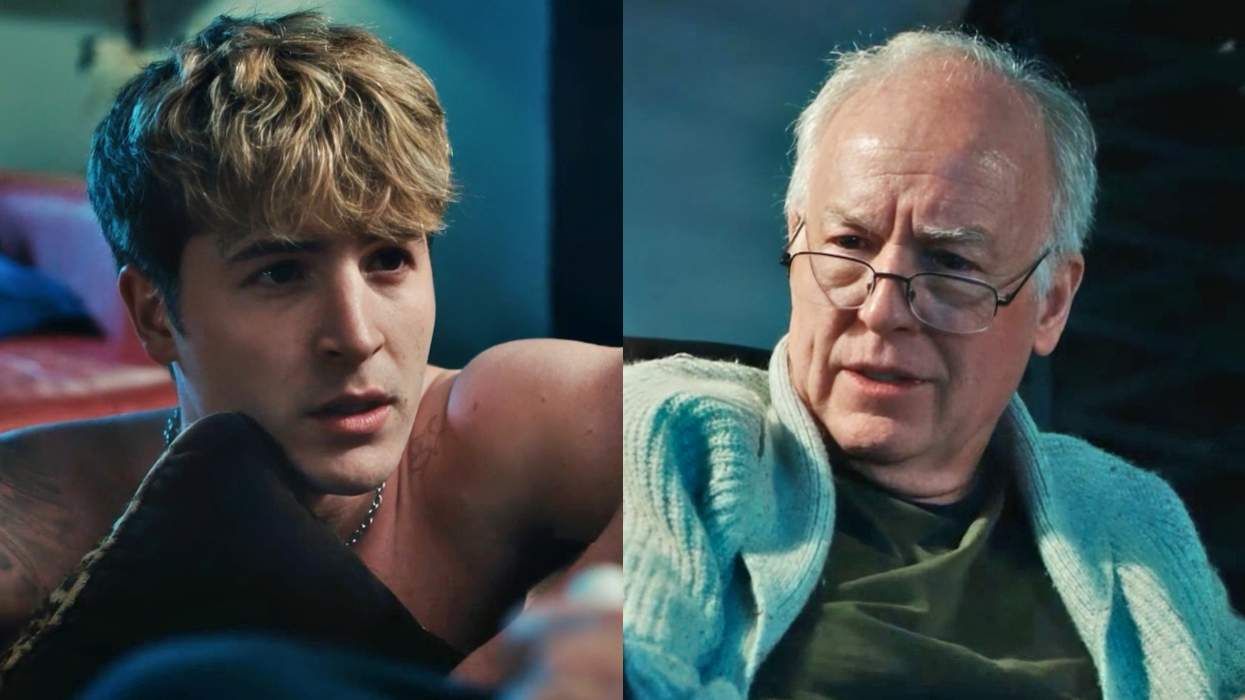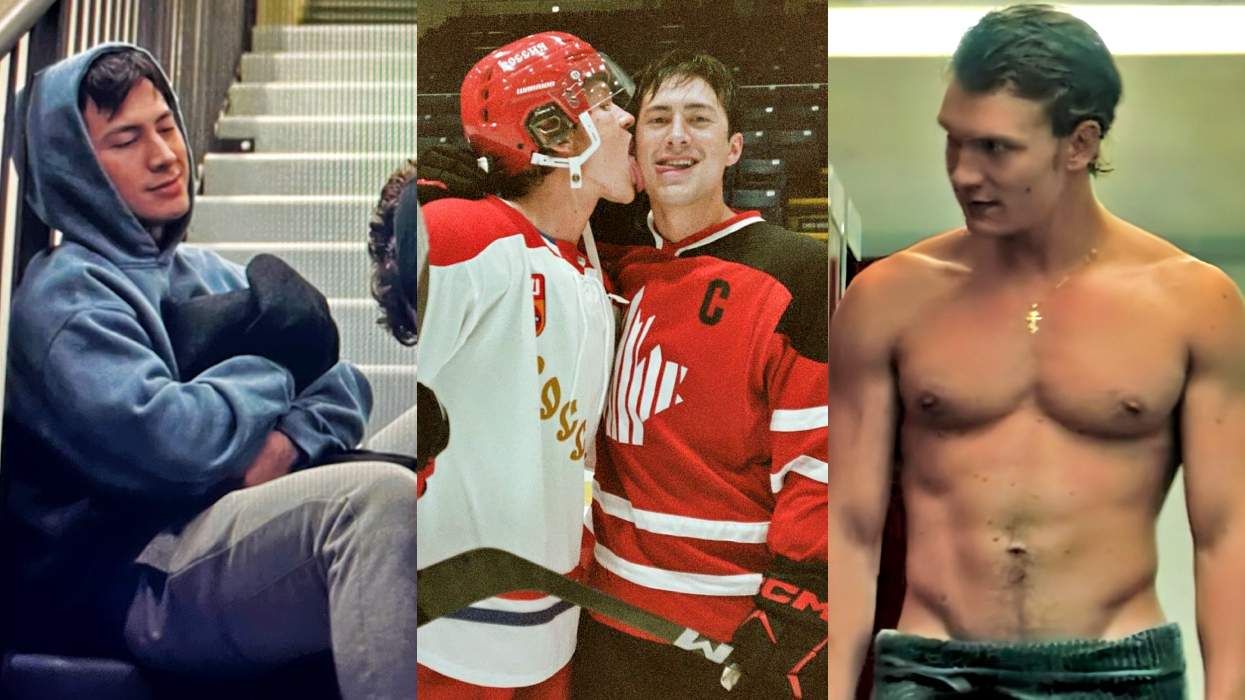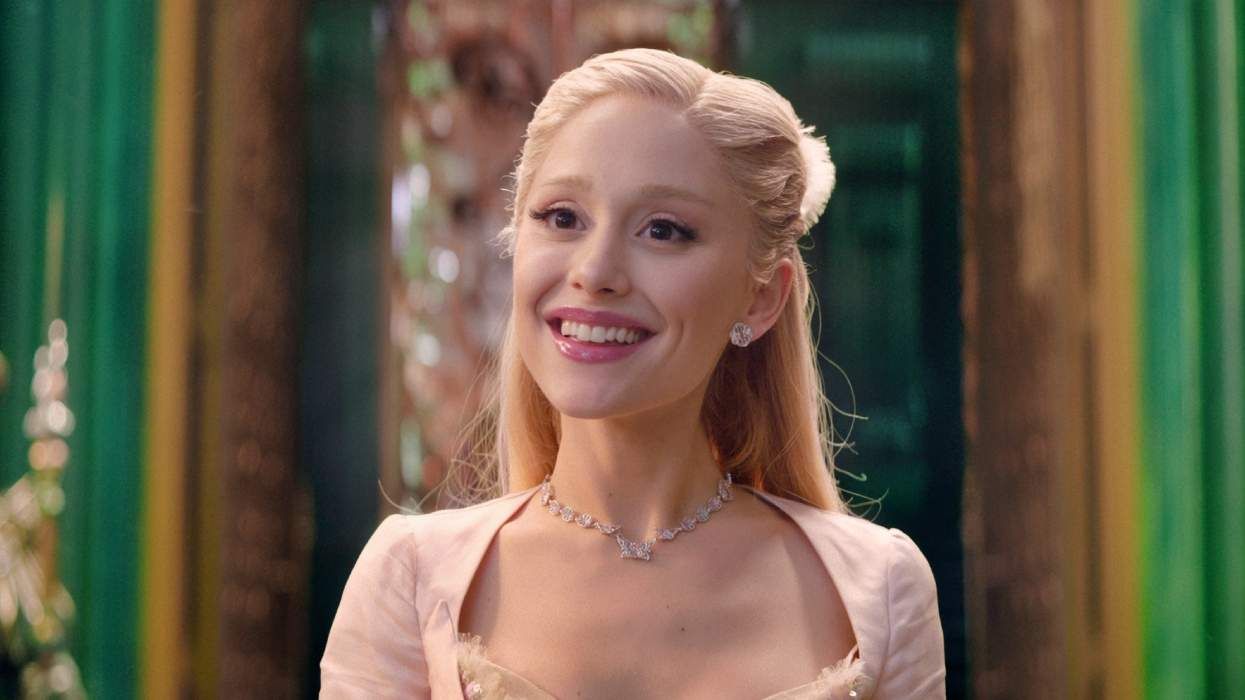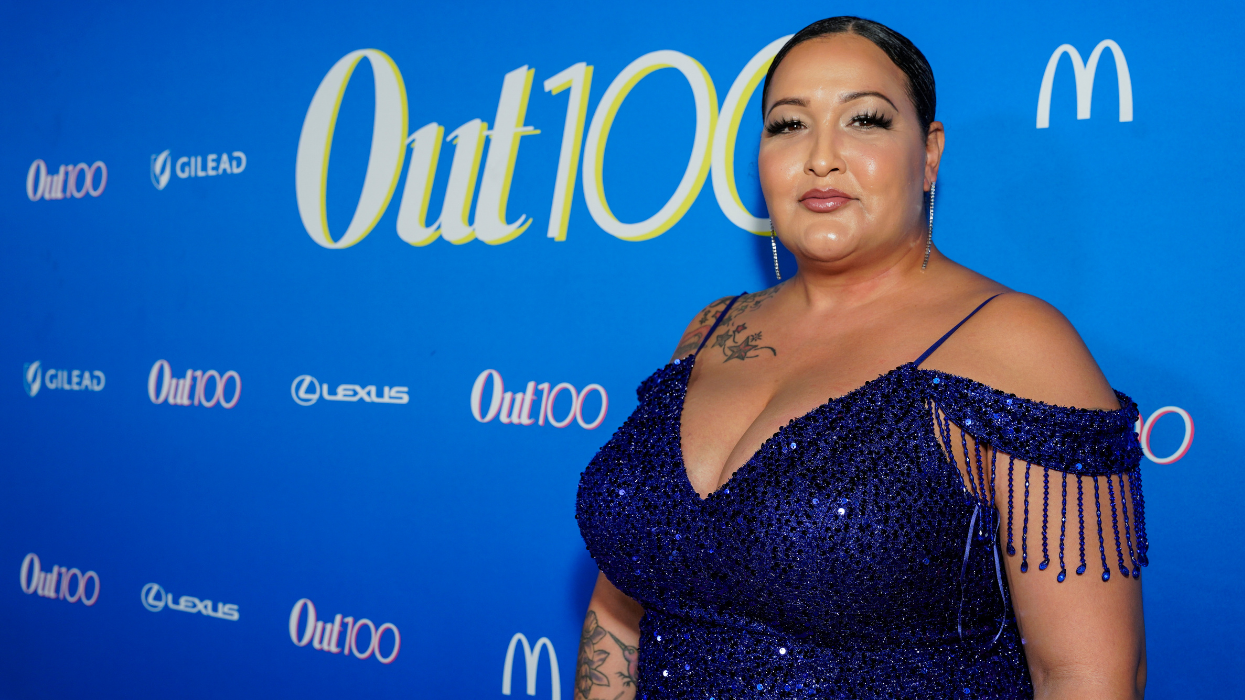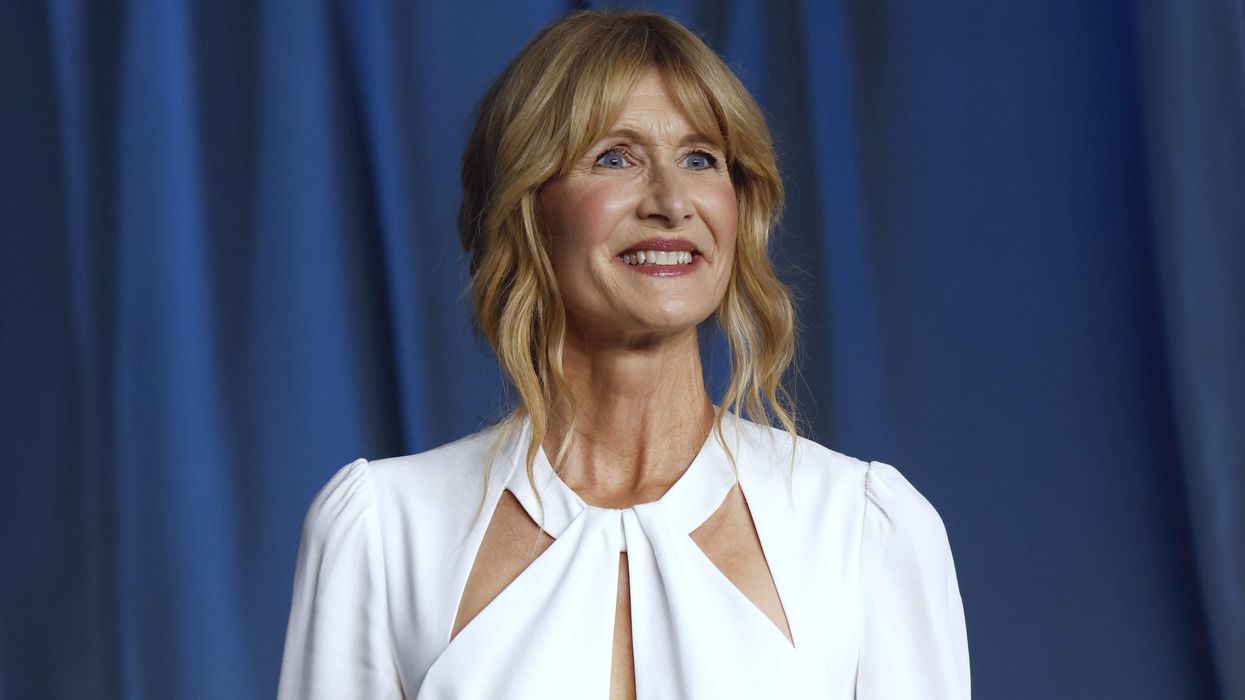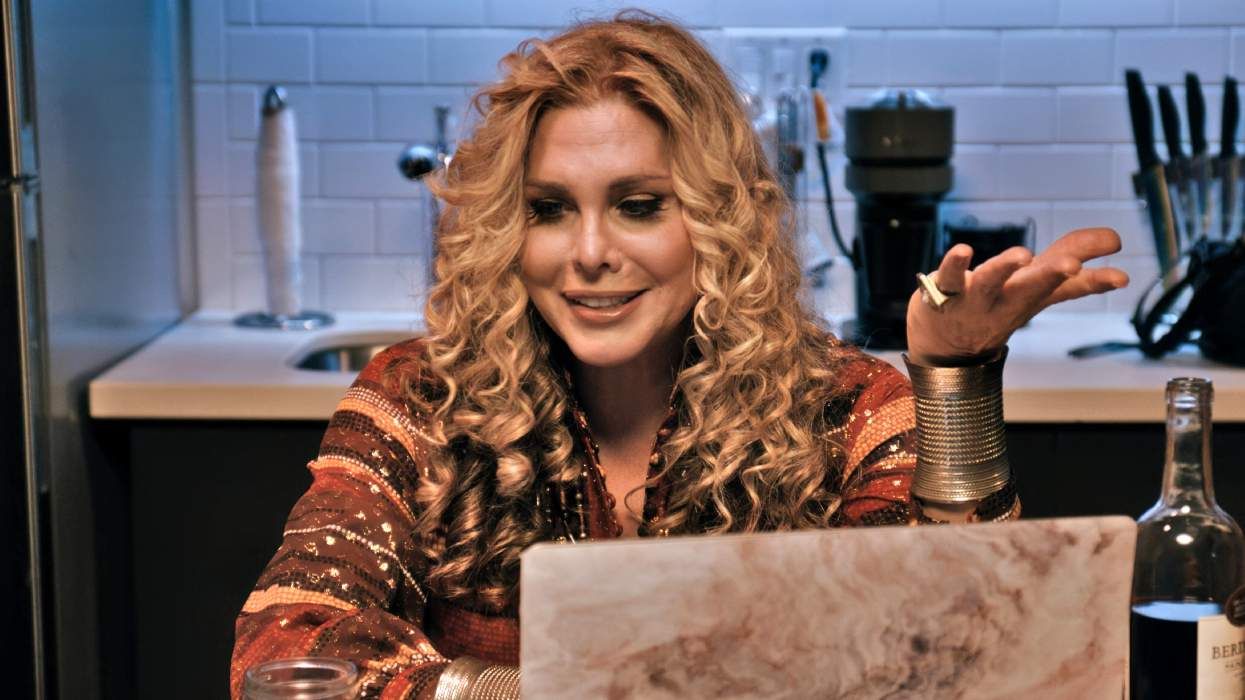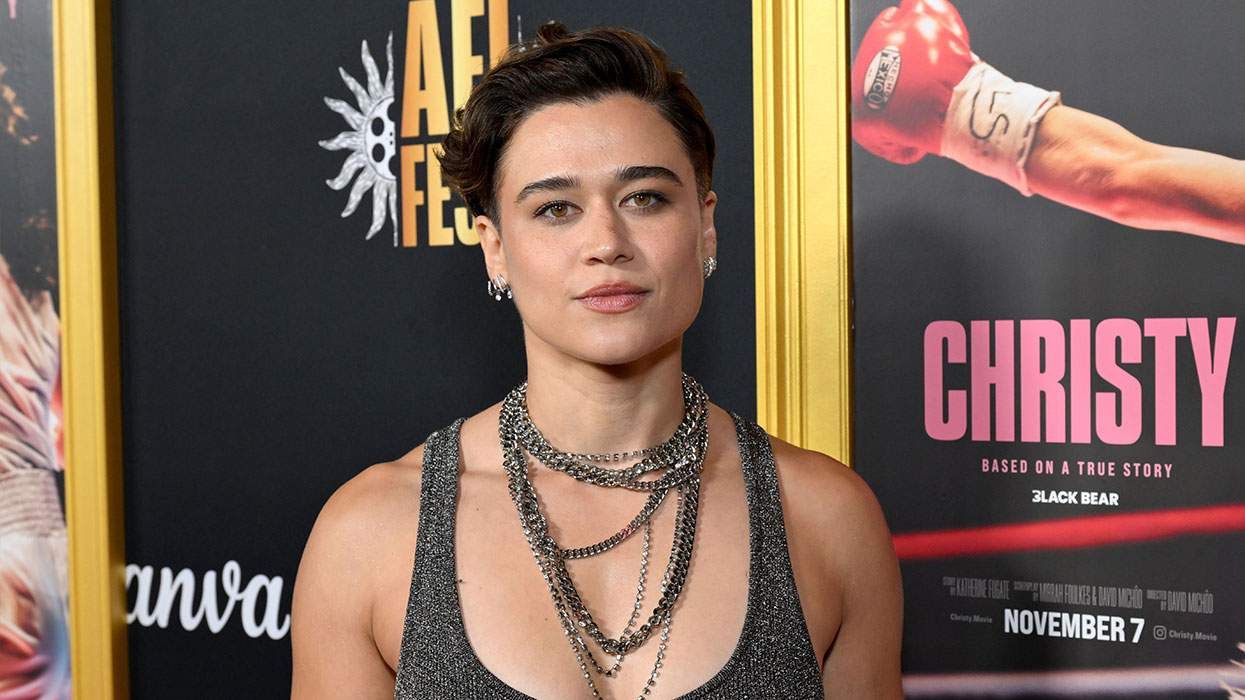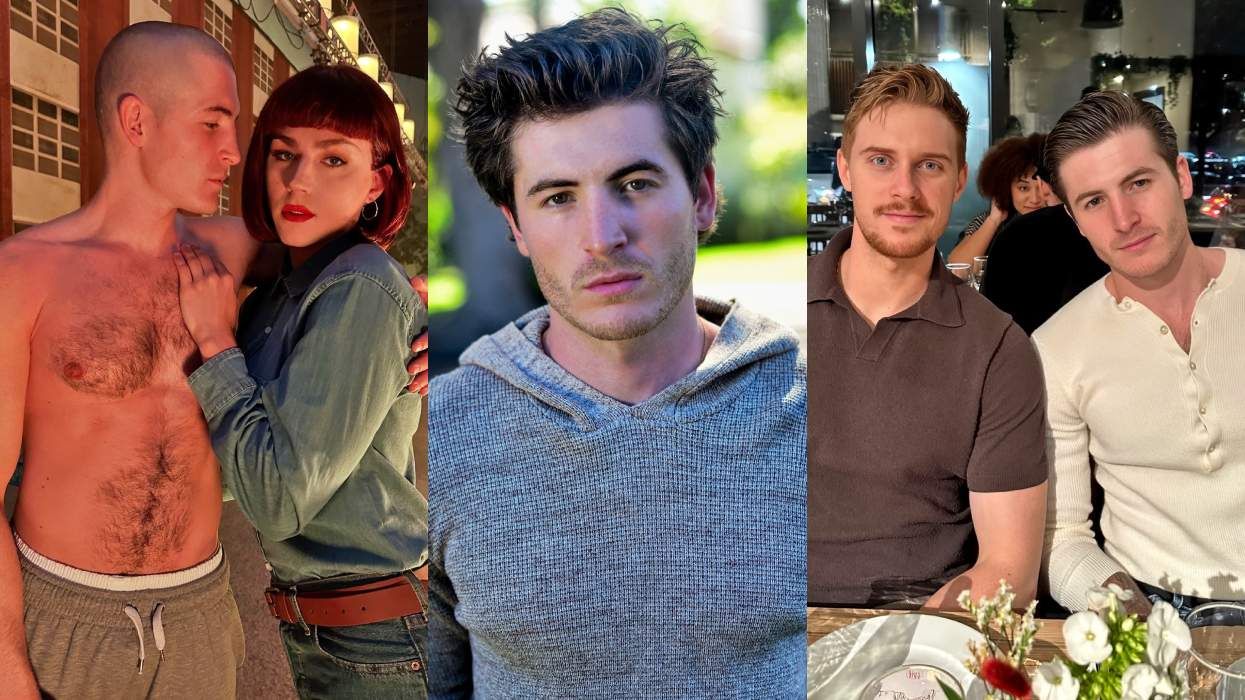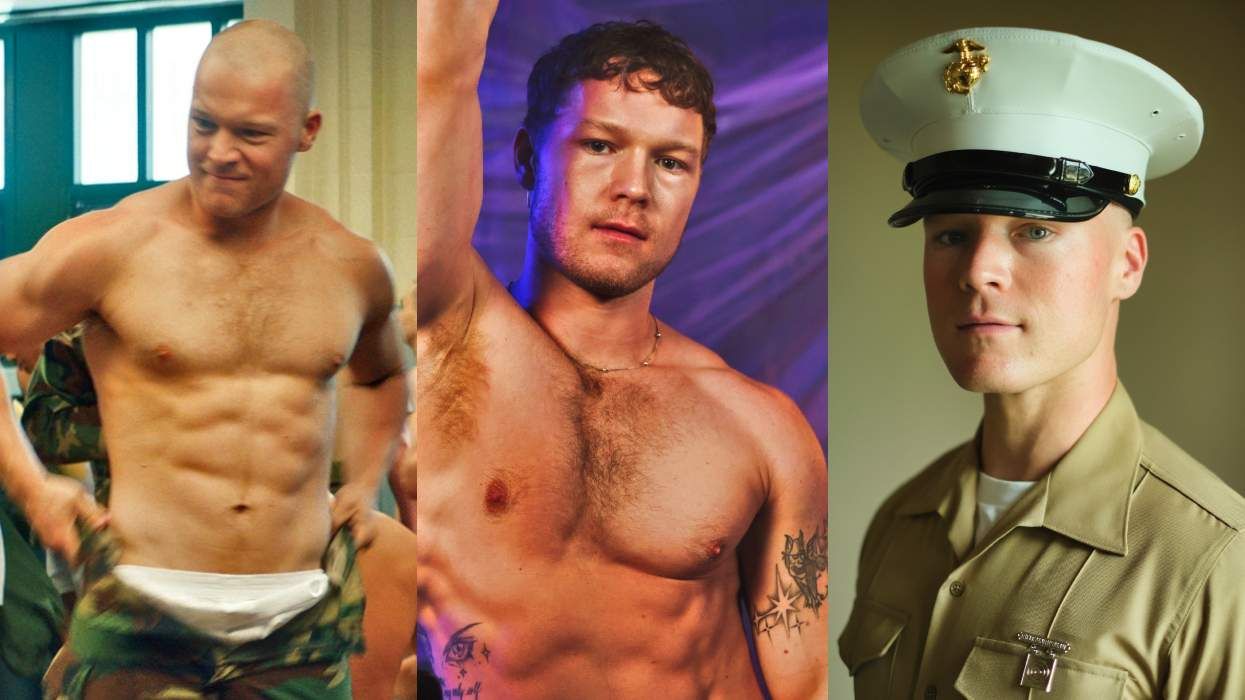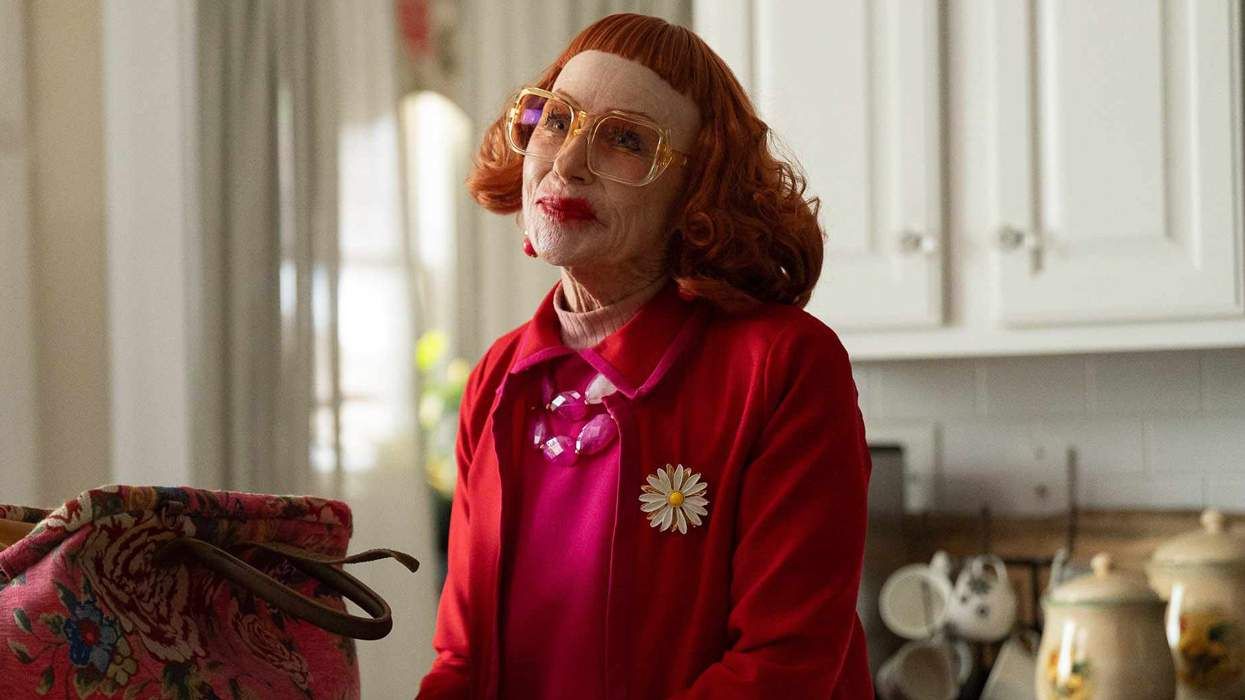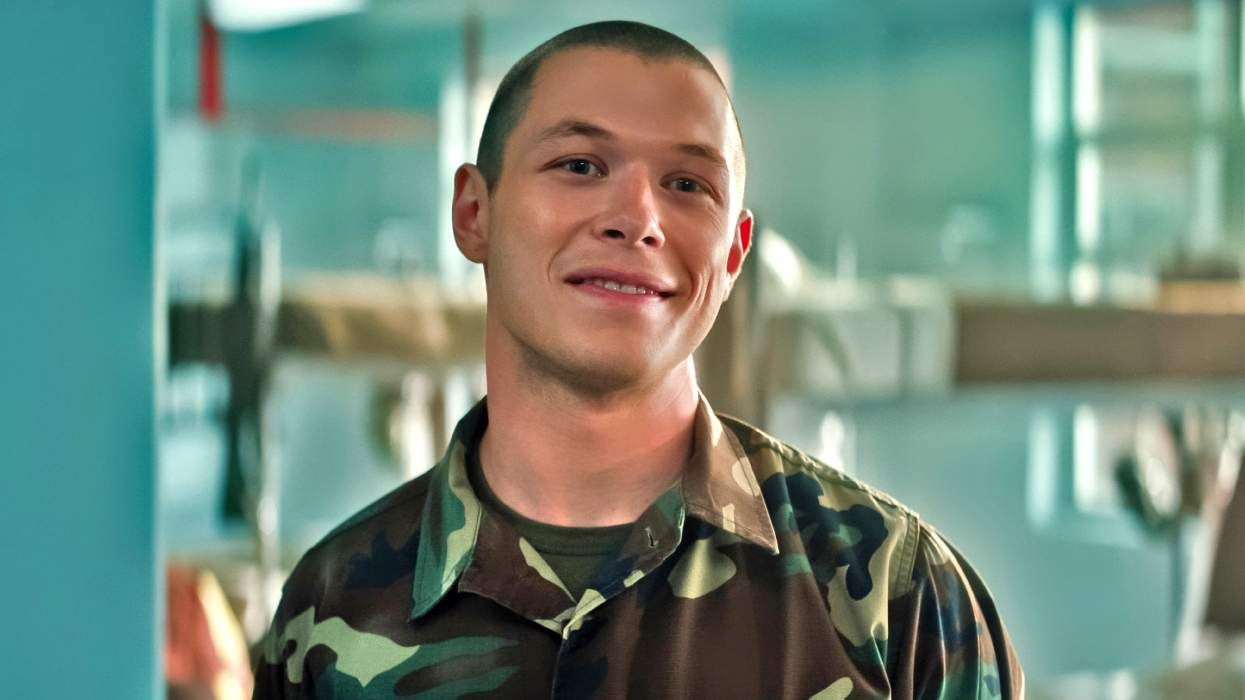Pictured: Nicholas Maury with Carmen Maura
French farce can sometimes be too much for American audiences. But in Mikael Buch's debut film, Let My People Go, we see how it can also work wonders. Buch's satire quotes familiar elements of other directors--think John Waters and Pedro Almodovar--to create a feel-good movie with a camp twist. Basically we see Reuben (Nicholas Maury), a gay Jewish Frenchman living in idyllic suburban Finland as a mailman (although he majored in "comparitive sauna studies" in college) with his gorgeous Nordic boyfriend. That is until a series of events cause him to flee back to his overbearing family in Paris, including his mother played by the iconic Carmen Maura (Women on the Verge of a Nervous Breakdown, All About My Mother) and Truffaut regular Jean-Francois Stevenin as his father.
The hijinks continue to mount in a series of hilarious scenes until it reaches ludicrous proportions. Buch was also lucky enough to work with Christophe Honore on the screenplay (read out interview with the writer-director about his last film, Beloved). Let My People Go opened last weekend at the Quad Cinema in New York City (and opens January 18 in Los Angeles at the Laemmle Royal and Town Center) but we caught up with Buch to discuss why he decided to make such a funny film with a feel-good message.
Why a French Jewish gay mailman living in Finland: where did that come from?
Well, the starting point of the film was the idea of this gay Jewish farcical character after some years in another country. We really wanted to talk about a character who has created an ideal life far from his family and be really integrated in an ideal world. The fact that he was a mailman was a way of showing that he was integrated in a perfect landscape. The starting point was this opposition of this guy who feels a stranger in his own country and is completely integrated in a foreign country.
So is Finland considered so ideal to Frenchmen?
When we started writing the film, neither Christophe nor I had ever been to Finland. At first I was worried about that but he said to me: It's not about talking about the real Finland, but about an ideal place that would be an ideal world for Reuben. We invented an ideal Finland and then went to film there. But it was really funny for the Finnish people because we were inventing our own Finland.
In some ways it looks like an ideal suburban American setting with its candy-colored perfect.
Yeah, that was what I wanted. I had the idea of the image of the suburbs in Edward Scissorhands. I really wanted that neighborhood. so I sent the images to the location scout in Finland and the poor woman went mad searching for this neighborhood for six months until she found it.
Wow, so it does exist. Is it in Helsinki or somewhere near it?
Yeah it's in the suburbs of Helsinki.
You mentioned Edward Scissorhands, but other than Tim Burton, is John Waters also a reference in this film?
This kind of filmmaking, Almodovar of course, filmmakers that redefine what good and bad taste mean and normality is supposed to be. I'm always interested by this kind of filmmakers.
It's difficult sometimes for American audiences to understand this. We want our French films to be very French, dramatic and serious. When the comedies come, like Le Placard (The Closet) or Dinner of Fools (Le Diner de Cons) these are sometimes confusing because they're not what they expect a French film should be. Yours gets beyond that in some way, and I wondered if you think that's because it has a gay or camp sensibility?
Yes, I think that's part of it. It has a sort of humor that is not only a French humor but a gay humor, a Jewish humor. So I think that these are things that can be understood in France and in the USA. I've grown up in Spain, my father's from Argentina, my mother's from Morocco. So I don't feel so especially French. I think the film is obviously French because we made it in France with French actors and I'm influenced by French cinema, but I think it has more of an international feel.
So what is the relationship between you and Christophe Honore? Had you worked on anything before this film?
Yes, well, I went to the National Film School in France and when you do your final study project, you have to choose a kind of mentor, so I asked him and we met that way. Ever since we had a very strong connection, and I worked on his films. So when it came time to write my first feature, it made sense to ask him because he knew me the best and the kind of the cinema I was going for.
It was a film I had in mind for a long time, so I sat down and wrote for 10 days non-stop and he knows me really well, so he knew--maybe better than myself--the way of making the film I wanted to make. I think that's what a good screenwriter is supposed to do.
You're pretty young, you're 29, when do you turn 30?
In July.
So you're a young guy, how do you get Carmen Maura to act in your first film?
It's pretty simple: You send the screenplay to the agent, and you just pray that they call back. And one day the phone rings when you're having dinner, and they say, "Hello, it's Carmen Maura," and you're ready to collapse. You know, I've been really lucky, the reaction to the script was really good, and I was able to have all the actors I wanted, my first choice. It's the kind of dynamic you don't really know what it creates. All the actors are important to me, so it was a kind of way of constructing my universe with actors that would bring with them a universe I love.
So much of the film hinges on your lead actor, Nicholas Maury, how was it working with him and getting him to go to these farcical levels?
Well, meeting Nicholas has been really important to me. I met him while I was still in film school. I wanted to do comedy for a long time. But the school I went to is a very prestigious film school, very serious all the New Wave directors went through it. And when I arrived in France, I wanted to do very dramatic films, so when I met Nicholas, it was really important to me because he has a very particular way of acting: farcical, modern. To me he was a modern gay Buster Keaton.
I felt like I could do a very ambitious and creative comedy with him. I did two short films with him and then he was a real inspiration when I was writing the proposal for this film.
I do feel like you're trying to have a message at the same time. You have a contemporary gay man who wants to have a perfect provincial life. And then you have an older man who comes out after his wife dies and wants to have a crazy, sexy, party life. So, have there many negative reactions to those ideas?
No I think people understand what I'm trying to do. It's all about freedom and people who are trying to find what they really want and what their desires are about. What's funny to me is to show a character like Goldberg, who can feel so liberated. He can be the president of the Jewish community and go then to a gay bar. Nothing is a problem for him; he does whatever he wants. Reuben is such a clumsy, tortured character. Everything is a problem for him.
I want to show how you reconcile the person you are supposed to be and the person you want to be.
But at the same time Reuben is very critical of his own father and his affair. So you have the son, who would typically be rejected, is now critical of the father's indiscretions.
Because everyone has an image of what they're supposed to be, the part they are supposed to play. There's a gap between those. The drama comes from the gap between these two things. They know they are not the perfect stereotype of what a Jewish mother or good Jewish father should be. A good brother, sister, or son.
The brother ends up crying because he's trying to be how people expect him to be.
Why are the Jewish stereotypes so important to you, the yenta mother for example?
I think they are an important part of life, it's how we construct our life. The Jewish ones are important because it's about family. Judaism is a lot about transmission and family connection. It's also about belonging to a community and what it means to an outer world. Reuben wants to run away from all this to be by himself. But he can't fully do that until he fully reconciles with his past and his childhood. I think it's about a person trying to put all the elements of his life together. The part of him he's chosen and the part he hasn't chosen.
You said, he feels like a foreigner in his own country. Where were you born?
I was actually born in France but I didn't live there until I was 18. I lived in Taiwan first and then in Barcelona in Spain.
So this idea of the foreigner, the immigrant, in one's own country is something I feel is often how gay people feel in their own country. They feel like an outsider looking in. What do you feel about that idea, that experience? Since you can't technically ever be a second generation or third generation gay "immigrant," who becomes acclimated to the culture, do you think that experience will ever change?
I think we might be going through a process where that is changing with all the questions of gay marriage and those kinds of things. I think of having this sense of not belong isn't always a bad thing. I think it gives you a perspective on things. Why we have had so many great gay artists in history is that: it gives you another position to look at the world. I don't see that as always a problem.
Do you think the film's message is very traditional? It's about family and relationships?
I don't think it's about go back to your family and live with them. I think it's about being whoever you want to be. nothing is impossible when you're talking about identity. You can invent a new way of being Jewish, French, gay, American or whatever. Those things don't have to be contradictory. Reuben doesn't have to choose between these identities. He can have it all.
It's very optimistic then.
Yeah, but I feel films can be, I don't want films to say how people have to live, but I want to do feel-good movies. That they can be liberating, braver, more daring to make their own choices.


